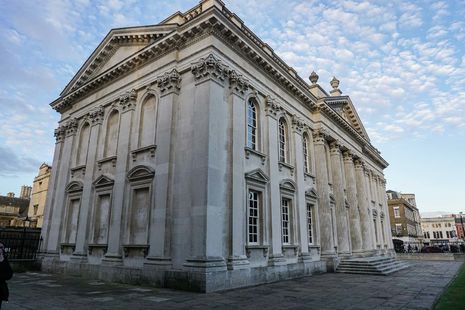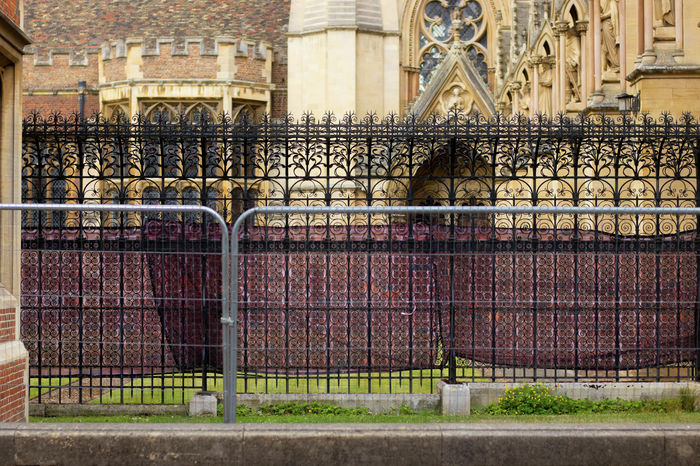Academics seek to restrict University’s use of injunctions
Professor Jason Scott-Warren has accused the University of paying ‘lip service to freedom of speech’ while siding with ‘repressive authoritarianism’

Over 150 academics have launched a rebellion to limit the University of Cambridge’s use of court injunctions to restrict protest, claiming that legal action poses a serious threat to freedom of expression.
English professor and member of University Council Jason Scott-Warren submitted a grace – the means of triggering a vote on University policy – that would prevent Cambridge from extending its High Court injunctions against protest to the University Council last week.
The grace would also prevent holding those who breach injunctions in contempt of court, meaning they would not face potential jail time or fines for their actions.
If the grace is passed, the University’s ban on pro-Palestine protests occupying its head offices, including the Senate House building, would not continue after it expires in July.
The University originally acquired injunctions against protest in March, preventing all pro-Palestine protesters occupying its central offices, following multiple encampments over the past year that forced graduation ceremonies to be moved.
Following the grace’s submission, Council will consider whether to allow the submission of the grace to the Regent House, which could be after the injunction’s expiry. It is not yet clear whether the University plans to extend their injunction.
The injunctions were labelled “anti-protest tactics” by Cambridge for Palestine (C4P) – the group responsible for the encampments – with a spokesperson also stating that the University can “expect us to come back any time they try to shut us out”.
This sentiment has been echoed by Scott-Warren in his justification for the grace, telling Varsity: “The use of injunctions by Trinity and St John’s shows that those high up in the University pay lip service to freedom of speech while they blithely side with repressive authoritarianism.”
“The idea that the University is giving Angela Davis an honorary degree at the same time as it is crushing a protest relating to the ongoing atrocities in Gaza is frankly beyond parody,” he continued.
The University has consistently denied charges that their injunctions restrict freedom to protest, with a spokesperson stating: “We have sought injunctions to protect the right of our students to graduate and for staff to carry out their work. Any claim that the University is trying to restrict protest or stifle debate is ridiculous – there are many ways protests can take place and voices can be heard.”
“Protests take place regularly in Cambridge, as is reflected in the judge’s decision which stated that ‘protesters and the campaign are left with ample opportunities and ability to protest their cause in Cambridge’. The judge made clear that the injunction ‘does provide a fair balance between the rights of all parties,’” they continued.
This move comes after two Cambridge colleges – Trinity and St John’s – filed for interim injunctions against pro-Palestine encampments, after protesters occupied both sites in an attempt to put pressure on them to divest.
The occupations lasted three and two days respectively, with both being evicted by College staff and court officials, pending a formal hearing on the injunction applications in the coming weeks.
These injunctions have been criticised by legal experts. Grant Kynaston, a representative of the European Legal Support Centre (ELSC), is challenging the injunctions. Kynaston claimed that continuations of the injunctions would cause “exceptionally wide-ranging and uncalibrated interference” with the protesters’ human rights, if passed.
However, in rulings on the injunctions, High Court judges have noted that there are still opportunities to protest without occupation. During the ruling on the University’s injunctions, High Court judge Justice Soole stated that “there are ample other places for these to be carried out,” adding: “I do not accept that in this or any respect the proposed injunction has the chilling effect which is alleged.”
 News / Colleges charge different rents for the same Castle Street accommodation2 March 2026
News / Colleges charge different rents for the same Castle Street accommodation2 March 2026 News / News in Brief: waterworks, wine woes, and workplace wins 1 March 2026
News / News in Brief: waterworks, wine woes, and workplace wins 1 March 2026 News / Angela Merkel among Cambridge honorary degree nominees27 February 2026
News / Angela Merkel among Cambridge honorary degree nominees27 February 2026 News / Climate activists protest for ‘ethical careers policy’1 March 2026
News / Climate activists protest for ‘ethical careers policy’1 March 2026 News / King’s hosts open iftar for Ramadan3 March 2026
News / King’s hosts open iftar for Ramadan3 March 2026









